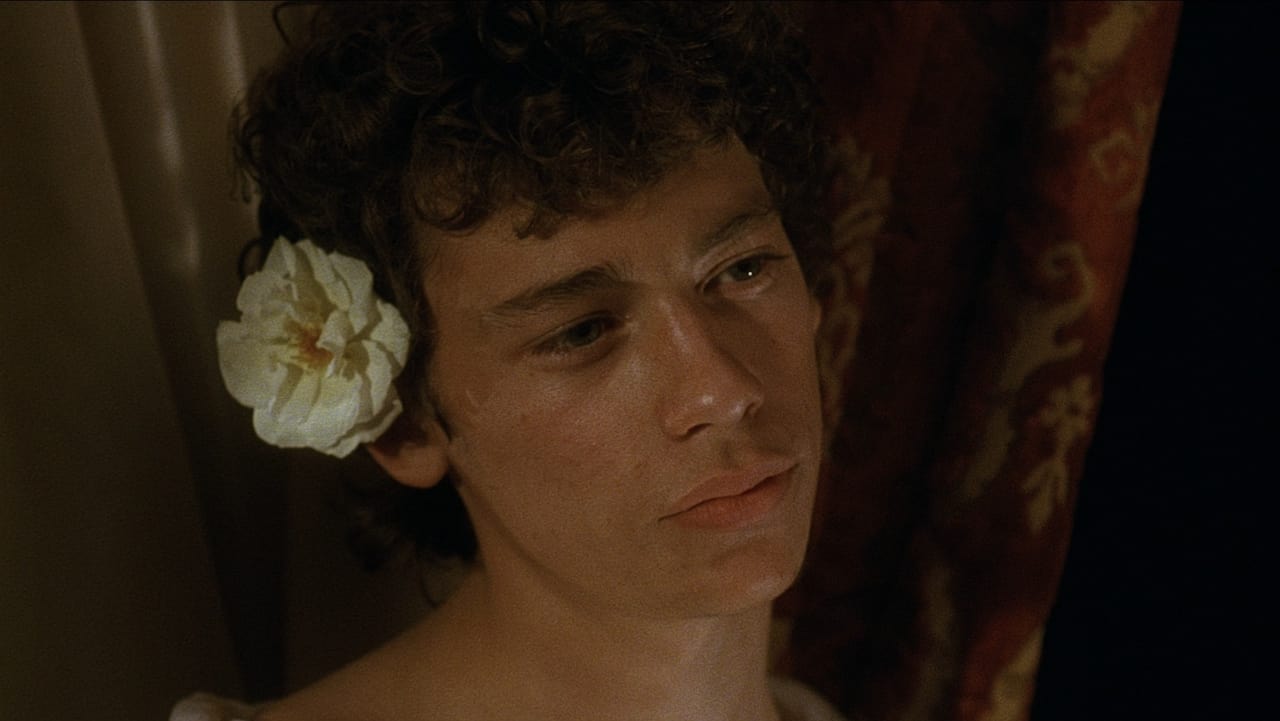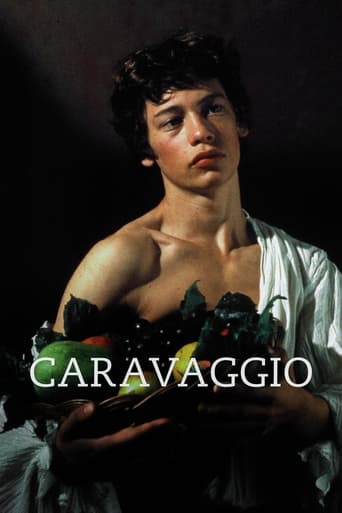

Sadly Over-hyped
... View MoreThe movie's neither hopeful in contrived ways, nor hopeless in different contrived ways. Somehow it manages to be wonderful
... View MoreAmazing worth wacthing. So good. Biased but well made with many good points.
... View MoreIf you're interested in the topic at hand, you should just watch it and judge yourself because the reviews have gone very biased by people that didn't even watch it and just hate (or love) the creator. I liked it, it was well written, narrated, and directed and it was about a topic that interests me.
... View MoreUnlike any other bio-film - "Caravaggio" (the fictionalized story of said 16th Century, Italian painter) brings the viewer right into the artist's studio.This film's strengths are in its superb cinematography, its fine cast, and, last, but not least, the marvelous works of Michelangelo Caravaggio, who was nothing short of being a startling genius.Caravaggio, whose art themes centred around sex, death, and redemption, is considered to be the greatest of the post-Renaisance painters.This controversial bio-film explores the artist's life, which was, indeed, very troubled by the extremes of burning passion and artistic radicalism. Here Caravaggio is depicted as a brawler, gambler, and drunkard with bisexual tendencies, who employed street people, harlots and hustlers as his models.Directed by Derek Jarman - "Caravaggio" contains several surprising anachronisms that don't rightly fit into the 16th Century landscape, such as a bar lit with electric lights, a character using an electronic calculator, and the sound of the occasional car honking its horn outside of Caravaggio's studio."Caravaggio" is certainly an intriguing piece of film-making that's sure to be enjoyed by any fan of the avant-garde.
... View MoreThis film deals with a painter of great fame from the end of the Renaissance. It is the story of a man of course but also of his assistant. He literally bought a mute boy out of his misery when he was a small child and took him to his studio to work for him, to grind his colors and prepare his paints. He will of course use the child as a model for some exuberant bacchic scenes overloaded with fruits of all sorts. The mute boy becomes the friend of the painter and little by little this friendship must have become love, real love, the mental and sentimental passion.On the other hand the artist is attracted by male bodies mostly but in the strength they demonstrate when they are fighting. So he is looking for violence, muscular tension, aggressiveness in males, one body against another, and some compositions of several men demonstrating their power in some scenes implying violence and cruelty. This search for violent brutality excludes love. It is pure desire and one of these men will have a tragic ending because he understood this desire required him to love the artist back and thus to do what he thought the artist wanted him to do. His mistake, especially since it was killing a pregnant woman.The only one who has the right (the artists granted him that right), the duty (the artists expected him to do what's concerned here), the obligation even to love him back, is the young assistant because that assistant was bought and is the artist's possession, the only person the artist has the duty and the obligation to take care of as if he were his own child. And in this case it is real love from the artist to the assistant and from the assistant to the artist, to and fro and back all the time. This assistant will bring the artist to his own death on his own death bed and he will be the only one able to bring him to death in peace, to grant him death in a way, though it will be for the assistant a tragedy, a drama with a phenomenal solitude afterwards, though this is not explored in the film. All other men the artists selects on their own strength are supposed to accept his love but definitely not love him back. They do not have that right because the artist only satisfies his own desire but never ever anything that has any real sentimental or mental dimension. He uses these men as satisfying actors in his sexual desire just the same way as he uses them as props in his studio to compose a scene that he can then paint on the canvass. Living and working close to the Pope, Caravaggio is classified a sodomite but tolerated because of his art, because of the marvelous paintings he can produce. But in this extremely sectarian and fundamentalistic society he is living in he is obliged to mind every step of his and pay for his privilege a very high artistic price. The result is that he is locked up in his sodomite closet and he has no way to get out of it. So his love is nothing but a perversion and he cannot expect from anyone to love him since it would be a perversion too. Then his love is reduced to a gross physical and violent impulse and he takes what he needs to satisfy this impulse, he pays for it since it is nothing but a forbidden fruit that has a very high price, and it is finished. Full stop. Period.And that is the moment when you start wondering about his assistant. Man cannot live without any love. If any love between two men is impossible as a permanent and stable relation, you have to disguise this relation in a way or another. The mute assistant is perfect since Caravaggio got him when he was six or seven and he has a very clear function and position to satisfy. The relation is seen by most people more like the relation between a father and a son and the possible sexual dimension of it might very well never have been consumed. Art least this part was not important. What was important was the tears shed by the assistant when his master died, when he brought him to death. I would easily say that any man longs for such a relation that is not and cannot be carnal. Men finds that in younger people who are their sons or close male relatives, at times younger men who need some mentor or leader or adviser. It is love but draped in some age or cultural dependency that makes it acceptable. Such a relation will never be sexual because it would be antagonistic with what the passion it contains means.And that distance in time between Caravaggio and us is clearly identified in the film with all kinds of anachronistic sounds or objects: electricity at the end of the 15th century, motorbikes, cars, trains, helicopters, cigarettes, etc. Has the world improved or is it still the same? I would say that in 1886 it probably looked pretty the same as around 1600. But it may also mean that luckily progress will bring some new way of looking at life and love.Dr Jacques COULARDEAU
... View MoreEverything is divided in two concepts: rule and transgression. That it's not a bad thing but for most people it's difficult to accept them, to comprehend them and to make both things interesting. Most of the time we tend to only follow the rules and forget about transgression or even condemn it. Caravaggio was a transgressionist in terms of art with his painting evoking religious themes using as models simple people, peasants, prostitutes, fishers, creating powerful masterpieces; and a transgressionist with his dangerous lifestyle, sleeping with men and women, getting involved in fights, in one of these fights he killed a man, reason why he ran away to other countries, and then dying at the age of 38. Then we have a filmmaker, an true artist named Derek Jarman who knows how to portray art on film, breaking conventions, trying to do something new and succeeding at it. To name one of his most interesting films his last "Blue" was a blue screen with voice overs by actors and his own voice telling about his life, his struggle while dying of AIDS, and he manages to be poetic, real about his emotions, and throughout almost 2 hours of one simple blue screen he never makes us bored. Who could be a better director for a project about the life of Caravaggio than a transgressionist like Jarman himself?The movie "Caravaggio" is wonderful because it combines many forms of art into one film, capturing the nuances of Caravaggio's colors and paintings translated into the film art. It has poetry, paintings, music of the period of the story, sometimes jazz music. All that in the middle of the story of one of the greatest artists of all time.This is not a usual biopic telling about the artist's life and death in a chronological order, trying to do everything make sense. This is a very transgressional work very similar to "Marie Antoniette" by Sofia Coppola, so it might shock and disappoint those who seek for a conventional story truthful to its period. And just like Coppola's film "Caravaggio" takes an bold artistic license to create its moments. Jarman introduces to the narrative set in the 16th and 17th century, objects like a radio, a motorcycle, a calculator machine among others; sometimes this artistic license works (e.g. the scene where Jonathan Hyde playing a art critic types his review on his typewriter, a notion that we must have about how critics worked that time making a comparison with today's critics, but it would be strange see him writing with a feather, even though it would be a real portrayal).The movie begins with Caravaggio (played by Nigel Terry) in his deathbed, delusioning and remembering facts of his passionate and impetuous life; his involvement with Lena (Tilda Swinton) and Ranuccio (Sean Bean); memories of childhood (played by Dexter Fletcher); and of course the way he worked with his paintings, admired by everybody in his time.All of this might seem misguided, some things appear to don't have a meaning but they have. I was expecting a movie more difficult to follow but instead I saw a truly artistic film, not pretentious whatsoever, that knows how to bring Caravaggio's works into life, with an incredible and fascinating mise-èn-scene, in a bright red that jumps on the screen with beauty. Very impressive. It's an unique and interesting experience. For those who enjoy more conventional and structured biopics try to watch this film without being too much judgemental, you'll learn great things about the Baroque period because it is a great lesson about the period. For those who like new film experimentations or want to watch a Jarman's film here's the invitation. 10/10
... View MoreThis beautiful visionary art film based on the director's take of the life of Caravaggio was worth the almost 7 years it took to make it. Derek Jarman had the brilliant sense to use Nigel Terry and Sean Bean as the lovers in this meditation on sexuality, criminality and art. This film is more of a fictionalization on Caravaggio using the artist's works as a way to pursue the story of the artist. It is beautiful, as are the actors and actresses, and Sean Bean is a revelation in this very early role, as he plays Ranucio, the love interest of Caravaggio. When he is on screen he steals the movie, as his animal magnetism, sexual energy, and wild persona grip the film and propel the story forward. This is an adult film with homosexual themes and might not be for everyone, but if one is adult and has a sense of taste, and loves art movies, this is a 10 out of 10.
... View More